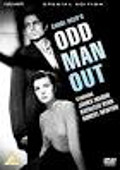
Directed by
Carol Reed
116 minutes
Rated PG
Reviewed by
Bernard Hemingway


Odd Man Out
Although by the standards of modern IRA dramas such as Jim Sheridan's In The Name Of The Father and The Boxer, Odd Man Out is, so to speak, careful to pull its political punches and is discursively over-loaded with colourful minor characters that slow down the narrative dynamic, it is one of the best-made of immediate post-war British films, skilfully directed by Carol Reed with striking photography that recalls Hollywood film noir of the 1940s by Robert Krasker, graced with excellent performances and a sympathetic score by William Alwyn.
Whilst being critically very highly regarded (Roman Polanski, for example, has cited it as one of his favourite films), to a large extent, the subject-matter which underlies the film, the IRA’s struggle for independence from the British, is subsumed by its style, which comes in somewhere between, on the one hand, the baroquely melodramatic with raking camera angles, hallucinatory scenes and musically-enhanced hand-wringing emotionalism and, on the other, romantic fatalism, epitomised by the figure of James Mason as Johnny MacQueen, an unlikely insurrectionist who does nothing but decorously expire through the course of the film (with a brief final rally towards its end). In this latter respect the final scene with Johnny stumbling against prison bar-like iron railings, supported by his devoted companion (Kathleen Ryan) as the ship supposed to provide his getaway pulls out and faceless policemen inexorably move towards him out of the snowy night is a masterpiece of cinematic staging,
Robert Newtown, who got equal billing with Mason, despite being a second-string character, is wonderfully over the top as a Gully Jimson-like painter and Denis O'Dea particularly memorable as a chilling Inspector Javert-like policeman determined to bring Johnny to justice.
FYI: Australian-born cinematographer Robert Krasker also lensed two other classics of the period, David Lean’s Brief Encounter and Reed's The Third Man.
Want something different?





